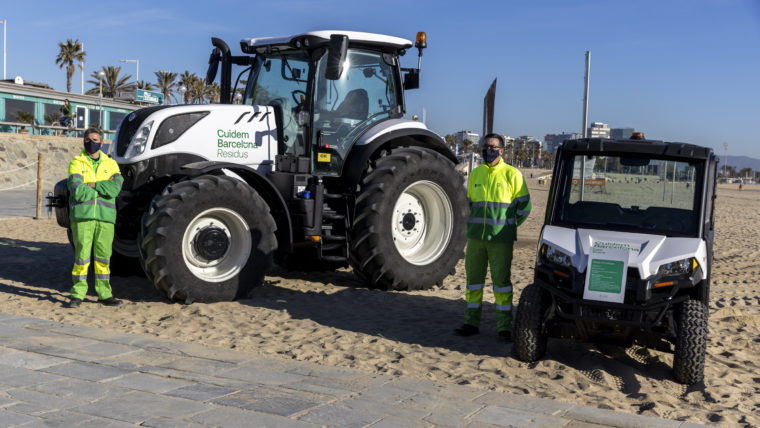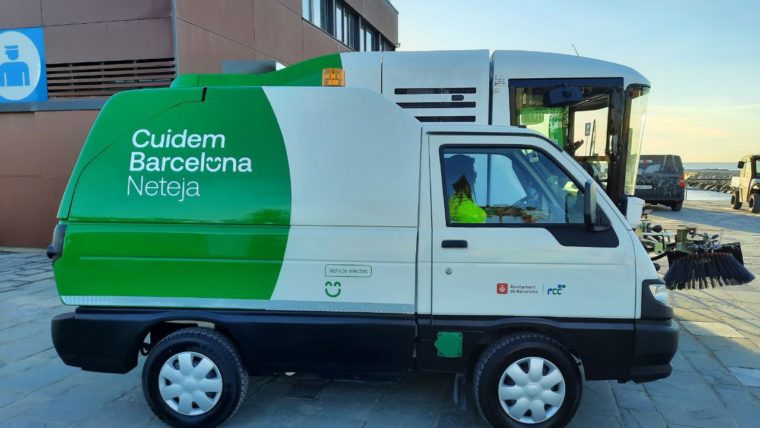A new cleaning contract adapted to each neighbourhood, with more staff and more sustainable vehicles
The new cleaning and waste collection contract for the next eight years will add more workers, new technology to manage and control the service, and electric vehicles to reduce pollution and noise. These improvements will gradually be introduced from March, enabling the service to adapt to the particularities of each neighbourhood.
The cleaning and waste collection service will adapt to the various spaces in the city in various ways:
- New machinery, including smaller road-sweeping vehicles for bike lanes, self-propelled electric barrows enabling cleaners to get around hilly areas better, smaller vehicles to reach narrow streets in the various old quarters and other vehicles specifically designed to work along the coastal area.
- Introduction of multi-purpose teams which can sweep, collect waste or carry out cleaning with water as needed.
- More water cleaning services in more areas, with more efficient use of groundwater.
- More services to clean stains from paving with specific equipment in streets and squares used more intensively by the public.
- More cleaning in green areas and parks in the city. The main parks will be cleaning in the morning and in the afternoon, every day of the week.
- Cleaning inside and outside of waste containers to be doubled. Containers will be cleaned inside once a week during the busiest six months and every fortnight during low season. The outside of containers will be cleaned every fortnight in high season and once a month the rest of the year.
- The cleaning service will now include deep cleaning of the paving beneath waste containers, with specific machinery enabling containers to be lifted while high-pressure water cleaning is carried out at the same time.
- More cleaning in the afternoons and on public holidays, adapting the service to citizen use and the use of public space.
- Specific work plan for each neighbourhood in the city after analysing representative cases and gauging the needs and demands of local people in each area.
Workforce of 4,400 people
The new contract anticipates a 10% increase in human resources to enable the service to adapt. Specifically, another 400 workers will be taken on, over half of whom will join street-cleaning teams (225). The new contract should also see more women occupy higher positions, a steady increase in the number of people with disabilities or at risk of social exclusion and a team of 40 permanent information staff operating at different points around the city.
More sustainable new fleet
The percentage of electric vehicles will rise from 20% to 66%, with a total of 870 vehicles, helping to improve air quality in the city. The fleet will also help reduce noise thanks to sound-proofing features on the vehicles.
As from the second week of March, the service will be implemented in five districts: Ciutat Vella, L’Eixample, Gràcia, Sant Andreu and Sant Martí. It will be rolled out in the rest of the city from September, in the districts of Sants-Montjuïc, Les Corts, Sarrià – Sant Gervasi, Horta-Guinardó and Nou Barris. Local people, shops and businesses will play an important part in the process, sharing responsibility in the roll-out of the service through neighbourhood meetings and monitoring commissions.
At the same time, a new model will be introduced for the distribution of waste containers to group all separate waste categories. This will mean selective waste containers will be grouped together at single locations wherever possible, allowing the number of selective waste containers to be increased by 25% and the number of rubbish containers to be reduced.
The roll-out of the new cleaning contract comes within the plan to care for Barcelona (Cuidem Barcelona), which sets out the comprehensive maintenance of public space. The plan began in October last year and involves an investment of 2,300 million euros over the next eight years.







